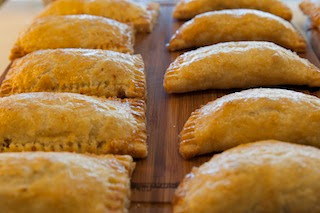I love Manilabake's calamansi polvoron and muscovado cookies that my hubby brought home last month. You can read his food review here :)
Press Release:
Manilabake by Serye Café Filipino, a bakery café that opened in Katipunan only this July, is the closest to “homemade” that one can get – if one defines “homemade” as being “well-made” or created with tender loving care, using a combination of traditional and innovative methods, and only the very best local ingredients.
Manilabake takes off from the recent trend of artisanal shops, where the baker as artisan uses all of his skill and attention in creating quality baked goods for his customers’ enjoyment and health. Its breads, cakes, pies and other pastries are made from heritage recipes, many of which involve much patience and time.
“Commercial food products nowadays are all too often made quickly to the detriment of eating quality, taste and nutritive value. Consumers have reacted, giving rise to a return to traditional ways of preparing food. Think of the slow food movement, for instance. Or the success of weekend markets that offer homemade goods,” said Gretchen Lim, proprietor of the bakery cafe.
Ms. Lim underscores that Manilabake by Serye Café Filipino practices many of the “time-honored ways of baking.” Although the bakers learn and apply the new ways that may be more efficient, they “do not compromise” on taste and nutritional value.
“Bakery products are among those products made too quickly. Many breads you buy are a product of way too much yeast, with way too much sugar and water, mixed at high speeds and then baked at a moderate oven just until the bread looks baked – all in order to get a product out from start to finish in under two hours. But good bread is the result of, among other things – pure ingredients, proper fermentation (or rise) and a full bake,” she explained.
Manilabake’s motto is “good bread comes from good baking.” The bakers patiently wait for the dough – well-mixed, hand-shaped, and laid out in a cool place to ferment – to develop flavor and structure fully, before it goes into the charcoal-fired, ceramic oven hot enough for the sugar to caramelize and the bread to fully bake.
“This process is not quick…,” Ms. Lim said, citing as example that the slow, cool rise of staple pan de sal takes over 12 hours.
“For our pastries (pies and empanadas), we developed a tasty, flaky crust as our base and we train our bakers to handle crust gently and properly to retain its tender-flaky characteristics. This again takes time.”
Each recipe was personally developed by Ms. Lim through “trial by fire” in the kitchen, so to speak, backed by short culinary courses and a lifetime of direct tutorials from talented cooks in the family.
“The recipes come from learning by observing my mother bake and through my own research and experience in the kitchen… There have been instances when we get the taste and texture at the first go but then we struggle with the final presentation,” said Ms. Lim.
Manilabake is very particular about the ingredients they use, favoring unbleached, chemical-free flour, Pangasinan sea salt and their own sourdough starter for their breads. Only the “right amount” of commercial yeast is used as additive.
The rest of the ingredients are also locally sourced: milk bought off the local dairy, eggs from the local farm, calamansi from the city market, wild honey from Palawan, muscovado from Sultan Kudarat, tablea chocolate from Malagos, cashews from Bataan, longganisa from Vigan, buffalo mozzarella from Nueva Ecija, and coffee from Benguet and South Cotabato, among others.
Being sister-establishment to Serye Café Filipino, the first authentic modern-Filipino café-cum-restaurant, Manilabake shares the same brand sensibilities of quality for value, and the brand philosophy of “Celebrating Filipino coffee, cuisine and culture.”
“What really occupies center-stage at Manilabake is the baked product, especially freshly-baked bread. It caters more to the baked goods market – those in search of breads, cakes or pastries. It also has a line-up of cooked meals but it is not as extensive, nor as filling, as those of Sérye Café Filipino,” said Ms. Lim.
Folks can park their car nearby, order their goods to-go, and bring home a slew of delicious baked treats as pasalubong. A quick stop for the harried office worker would take care of the office baon for lunch, and also solve that nagging question of what to bring to an after-work occasion (or impress one’s dinner date with).
The bakery café may also serve as an alternative to the neighborhood coffee shop for a light meal, with coffee and dessert. If a snack is all you’re looking for, the Champorado (chocolate-flavored porridge made from tapol or wild, glutinous purple rice, P145) and Shepherd’s Pie a la Cubana (mashed camote and mashed potato blanketing the meat filling, P195) will also suit nicely.
Current bestsellers include: the Pan de sal (P8; whole wheat, P10; barbecue-filled, P45), Bonete bread (P5), Cinnamon Raisin Loaf (P225), Macapuno Pandan Cake (six-inch round, P495; nine-inch round, P885), Mocha Manila Cake (six-inch round, P770; nine-inch round, P1,215), Calamansi Cupcake (P70) or Pull-Apart Loaf (P180), Tsokolate Biscotti (P150), Muscovado Cookies (12 in a jar, P170; 20 in a jar, P280), and coconut sugar-sweetened Apple Pie (P145).
MANILABAKE by Serye Café Filipino is located at 206-A Katipunan Avenue, Blue Ridge A, Quezon City. Operating hours are 6 a.m.–9p.m. from Monday to Sunday. Deliveries are free within a five-kilometer radius. For orders, call (02) 509 1973 or (0916) 4984547.

















No comments:
Post a Comment